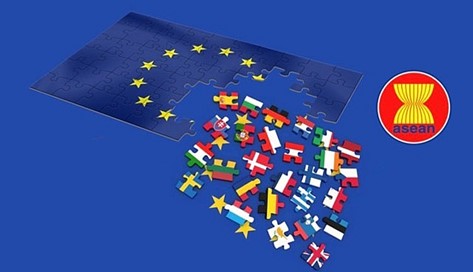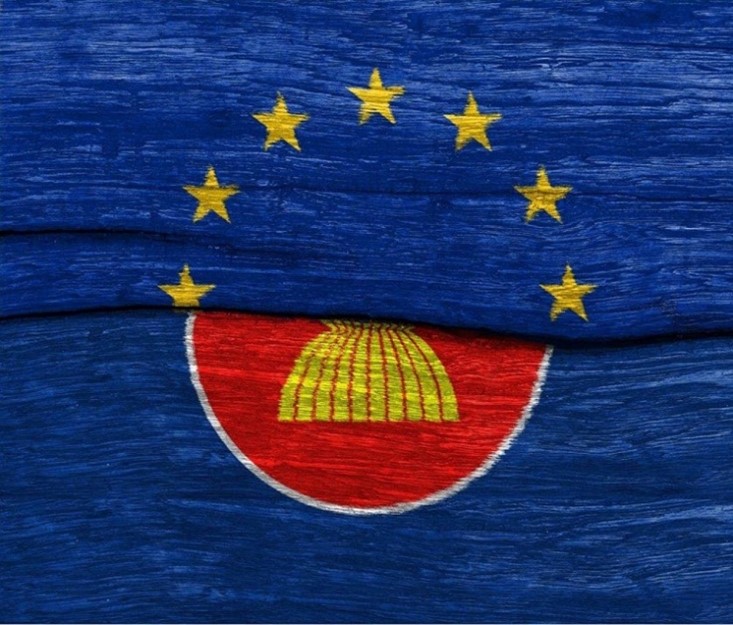Tổng số bài đăng 432.
The European Union (EU) has long been one of ASEAN’s key dialogue partners, with formal relations established in 1977. Over the decades, the two economic blocs have developed a strong partnership, characterized by robust trade growth, extraregional investments, integration into global value chains, and high mutual market demand. As their economic ties deepen, both sides are working to enhance connectivity and fully unlock the potential of their collaboration.

Long-standing Trade Relations
The EU consistently ranks among ASEAN’s top three trading partners and remains a leading source of foreign direct investment (FDI). In 2021, bilateral trade volume reached $268.9 billion, marking an 18.6% increase from 2020 and a 16.7% rise compared to 2017, accounting for approximately 10.23% of ASEAN’s total trade. Between 2010 and 2019, EU exports to ASEAN grew by 57%, amounting to €85 billion.
Trade between ASEAN and the EU has undergone notable fluctuations between 2017 and 2021, particularly slowing in 2019 and 2020 due to the complex impacts of the COVID-19 pandemic. However, trade rebounded strongly in 2021, with ASEAN’s exports to the EU reaching $152.2 billion, up 16.81% from 2020 and around 10% higher than 2017. Meanwhile, ASEAN imports from the EU rose to $116.7 billion in 2021, a near 21% increase from 2020 and a 27.04% surge compared to 2017, according to ASEANstats.
ASEAN’s appeal lies in its dynamic and fast-growing economies, underpinned by a young, tech-savvy population of nearly 700 million. For European businesses, including small- and medium-sized enterprises (SMEs), the region presents vast opportunities for growth and investment.
Meanwhile, the EU emphasizes advancing its core values and strengths, including trade, investment, development cooperation, climate change, science and technology, green transformation, and digital transformation—areas that align with the cooperation needs of ASEAN as a region and its individual member states.
Enhancing Economic Connectivity
The ASEAN-EU Comprehensive Air Transport Agreement (AE CATA), signed in June 2021, marks a significant milestone in connectivity. As the first air transport agreement between the two blocs, AE CATA permits unlimited passenger and cargo services between the regions, fostering trade, tourism, and economic recovery in the post-pandemic era.
In parallel, the EU has signed free trade agreements (FTAs) with several ASEAN countries, such as the EU-Singapore Free Trade Agreement (EUSFTA), effective November 2019, and the EU-Vietnam Free Trade Agreement (EVFTA), effective August 2020. These FTAs offer enhanced market access for European businesses, facilitating two-way trade with Singapore and Vietnam while promoting economic ties with ASEAN. Additionally, the EU is actively negotiating bilateral FTAs with Indonesia, the Philippines, Malaysia, and Thailand.
The Regional Comprehensive Economic Partnership (RCEP) also offers a strategic avenue for European businesses to access ASEAN markets. By establishing production bases in RCEP member countries, businesses can benefit from tariff reductions, harmonized rules of origin, and preferential market access.

Expanding Collaboration Areas
Green and digital transformations are key priorities for the EU in recent years. ASEAN’s efforts, such as negotiating a Digital Economy Framework Agreement (DEFA) and implementing the ASEAN Circular Economy Framework, have attracted EU interest and support.
ASEAN’s green transition, projected to create $1 trillion in annual economic opportunities by 2030, facilitates EU-ASEAN collaboration. With extensive experience in smart urban solutions, the EU can support the ASEAN Smart Cities Network Initiative, which is expected to generate $400 billion annually out of the $1 trillion green economy potential.
In economic cooperation, the EU supports ASEAN through two flagship programs: (i) the ASEAN-EU Programme on Regional Integration Support and ARISE+ project, and (ii) the Enhanced Regional EU-ASEAN Dialogue Instrument (E-READI). These programs aim to promote inclusive economic growth and regional integration, facilitate policy dialogue on political, economic, and social issues, support the implementation of the ASEAN Economic Community Blueprint, and strengthen cross-sectoral capacity for ASEAN member states and the ASEAN Secretariat.
Currently, notable joint initiatives between ASEAN and the EU are being implemented through three official programs: the ASEAN-EU Green Initiative, the EU-ASEAN Sustainable Connectivity Package (SCOPE), and the ASEAN-EU Regional Dialogue Instrument (E-READI).
By fostering connectivity and cooperation, the EU and ASEAN aim to sustain economic growth and ensure shared prosperity in an increasingly interconnected world.









